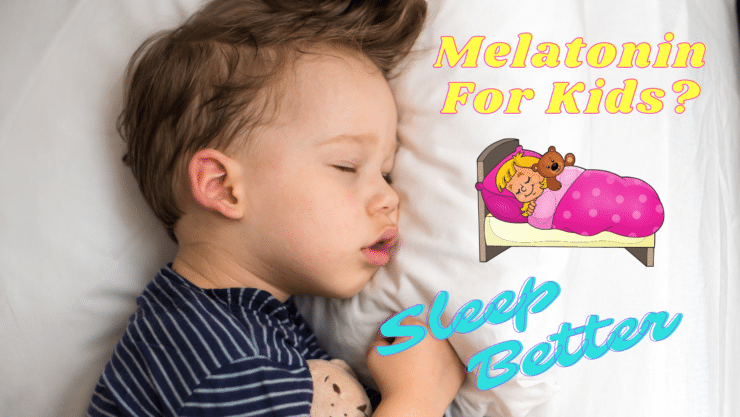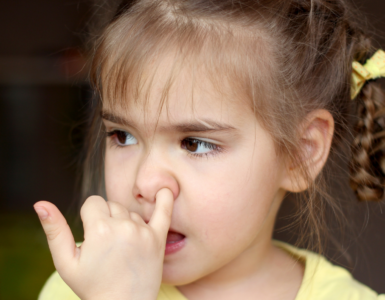For children, sleep is especially important in allowing them to grow and develop proper disease immunity and behavior. Children who do not get enough sleep may become cranky and irritable, they may develop issues at school, high blood pressure, weight problems, headaches, and even depression.
According to the American Academy of Pediatrics, up to 25% of children and adolescents have difficulty falling and staying asleep. When children cannot fall asleep naturally, parents may resort to sleeping supplements, such as melatonin.
A report published by the Centers for Disease Control and Prevention (CDC), states that “during 2012-2021, the annual number of pediatric ingestions of melatonin increased 530%.”
This means that more and more parents are turning to melatonin as an over-the-counter sleep aid for their children.
But is melatonin safe for kids? Continue reading for important information about melatonin and its effects on children.
What is Melatonin?
Melatonin is a natural hormone the body produces to regularize sleep-wake patterns, otherwise known as the circadian rhythm.
There is an inverse relationship between melatonin levels and daylight. Typically, melatonin levels rise when daylight decreases, and they fall when daylight increases.
In general, melatonin should be taken one to four hours prior to the desired bedtime. Although it does not cause drowsiness, it does lower body temperature, naturally signaling to the brain it is time to sleep.
Benefits of Using Melatonin for Children
Although the research on the effects of melatonin on children is limited, some of the findings seem to be promising.
It is recommended that melatonin be used as a short-term strategy for children who struggle to fall asleep at night or those who cannot get enough sleep.
Additional findings have shown that melatonin can be used for children experiencing autism spectrum disorders (ASD), attention-deficit/hyperactivity disorder (ADHD), and migraine headaches.
Always talk to your healthcare provider before giving your child melatonin or any other dietary supplement. They may help you figure out the dosage and timing for your child.
Side Effects and Risks for Children Taking Melatonin
In general, melatonin is considered safe for short-term use as it does not cause withdrawal or other symptoms of dependency.
However, some children may experience mild side-effect symptoms, such as headaches, dizziness, nausea, bedwetting, and agitation.
In rare cases, melatonin can cause transient depression, it may increase existing depression and seizures for people with epilepsy, and it may exacerbate autoimmune diseases.
Additionally, the long-term effects of melatonin on children are unknown and more research is required.
Never give melatonin to infants since their circadian systems are still developing and the long-term effects on them are unknown.
Additional Things to Know About Melatonin
Melatonin is an over-the-counter dietary supplement that is not regulated by the US Food and Drug Administration (FDA).
Therefore, due to the lack of government oversight in the United States, the amount of melatonin in tablets and liquid form can vary, especially in chewable tablets, which is what children usually take.
Additionally, companies can add other ingredients without disclosing them on the label.
If you do decide to give your child melatonin, select a product that is USP Verified, as they are usually higher quality products.

Start your child off on the lowest dose and try not to give it to your child every night to avoid their body getting used to it and having to require higher doses.
Helping your Child Sleep Without Melatonin
Although melatonin is considered a natural sleep aid with mild side effects, you may choose to find other natural alternatives.
Here are a few things you can do to help your child fall asleep naturally and stay asleep through the night.
Have a Regular Sleep Schedule. Creating a consistent sleep schedule will help regulate your child’s body systems.
By having a nightly bedtime schedule, you will train your child’s mind and body to begin to fall asleep at the scheduled time.
ALSO: What is Sadfishing?
It is ok to allow your child to stay up a little later during the weekends or when on vacation. However, do not deviate too much from their regular bedtime so their sleep-wake pattern is not disrupted.
Establish a Calm Bedtime Routine. Limit too much stimulation right before bedtime. The goal is to create calming rituals that will signal to your child it is time to prepare for bed.
A warm bath, cuddles, and reading a book will help create a relaxing atmosphere before bed.
ALSO: Five Affirmations Mothers Should Say Every Day
Create a Sleep Environment Conducive to Sleep. Creating a calming environment by dimming the lights and removing stimulants at least one hour before bed will help your child transition to bedtime.
Help your child figure out what will help them sleep by going over their lighting and noise preferences. Some children may enjoy complete darkness, while others may require a nightlight. Some children may prefer silence versus white noise or calming music.
ALSO: Fun Ideas for Staying Active Together as a Family
Creating a safe, sleep-friendly environment will help your child transition to sleep mode with greater ease.
Keep Your Child Active During the Day. By keeping your child physically active during the day, you ensure they are tired by the time bedtime comes around, which will help them fall asleep faster.
No Naps During the Day. If your child has stopped napping during the day, do not let them nap, even if they went to bed late or had a rough night. Doing so will disrupt their schedule and it will take some time to get back on track.
Shut Off All Screens Before Bed. Aim to shut off all devices one to two hours before bedtime.
The blue light emitted by screens can trick the brain and wake it up.
Some Final Thoughts
Sleep is essential for everyone, especially children. Lack of sleep can impact children negatively; therefore, when children struggle to sleep or to stay asleep, parents may resort to sleep aids.
ALSO: What is the Most Dangerous Day of the Week for Halloween?
Melatonin is considered a safe sleep aid for children. However, be sure to understand the benefits, side effects, and risks before giving your child melatonin.
And be sure to consult your child’s pediatrician before giving them any dietary supplements, such as melatonin. They may guide you through dosage and timing based on your child’s age and weight.









Add comment